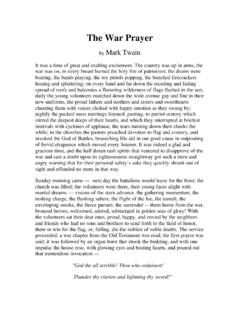Transcription of Score - White-Wilson
1 WW0149 - CACS Info Booklet 3/19/04 9:59 AM Page 1 Distribution ofCalcium Scoresin WomenCalcium scores <11 are associated with a lowlikelihood (<1%) of any CAD and have excellentprognosis. Please follow the general healthguidelines for primary prevention of CV disease:reduce dietary fat intake, exercise regularly, stopsmoking, treat hypertension is it exists. See yourprimary physician for information or help. RepeatCACS scan in 2-5 between 11 and 400 are associated witha significant (>2% per year) risk of future cardiacevents, especially with scores above 100. Putsimply, a calcium Score of more than 10 indicatesthe presence of Coronary Heart Disease andrequires a reduction of LDL cholesterol to lessthan 100 mg%. See your primary physician forinformation and scores >400 indicate extensive CADand a high likelihood (>90%) of at least onesignificantly obstructed coronary vessel (>70%stenosis). You are at increased risk for thedevelopment of symptomatic cardiac disease( per year) and may need additional see your primary you do not have a primary physician or wishto discuss the implication of your CoronaryCalcium Score , please call Ms.
2 Cherie Penas,ARNP, for a Preventive Cardiology consultationat White-Wilson Medical Center Department ofCardiology, of calcium Scores by percentile rank in Asymptomatic Men and Women&25th50th75th90th35-39 40-44 45-49 50-54 55-59 60-64 65-7010,0001,000100101 AgeScore35-39 40-44 45-49 50-54 55-59 60-64 65-7010,0001,000100101 ScoreAgeDistribution ofCalcium Scoresin MenPercentile Rank1005 Mar Walt DriveFort Walton Beach, Florida ARTERY calcium SCORINGCORONARY ARTERY calcium SCORINGCORONARY ARTERYCALCIUM SCORINGCORONARY ARTERYCALCIUM SCORINGINFORMATION REGARDINGWW0149 - CACS Info Booklet 3/19/04 9:59 AM Page 2 AAnalysis of the amount of calcium in coronaryarteries has only recently been possible with theadvent of ultra-fast CT scanning. CT scannersthat can image 16x per second essentially stop the beating heart and allow us to see whetherthere are specks of calcium in the coronary arteries lie on the surface of and supplyblood to the heart.
3 If they become obstructed, theresult is coronary artery disease (CAD) or heartdisease, which can lead to a heart process that results in a heart attack beginswith damage to the lining of the blood vessel wallsand continues over a long period of time. Thereare a number of risk factors, genetic andotherwise, that can increase one s chances ofdeveloping coronary artery disease: age, sex, highblood pressure, diabetes, cigarette smoking, does a Coronary calcium study tell us?First, the presence of any calcium in the coronaryarteries is indicative of atherosclerosis (hardeningof the arteries) or heart disease. Over the years,the lining of the arteries goes through severalstages of damage and repair. Ultimately, the repairprocess results in calcium deposits in the coronaryarteries, also known as plaque. Plaque depositsmay be large or small, and over time they canbuild up and block an artery, resulting in the is the only process that resultsin the deposition of calcium within the wall ofan artery.
4 Atherosclerosis is an active it is associated with aging, arterialcalcification is not a degenerative process and isnot related to aging. As arteries becomeincreasingly blocked, less blood passes throughto the heart, resulting in symptoms such as chestpain or heart , with Coronary Artery calcium Scoring,we can detect the presence of atherosclerosislong before a patient experiences any the newest generation of CT scanners, weare able to generate detailed computer images ofyour heart and arteries. We analyze these imagesand determine the amount of calcium present,then convert our findings to a Cardiac calcium , while the Coronary calcium Scoreprovides an evaluation of overall coronaryatherosclerotic amount, it does not tell us anythingabout how blocked a particular artery might is, the calcium Score does not indicate whereor to what degree blockage is present. However,the calcium Score does directly correlate with therisk of cardiac events, such as heart attacks.
5 Thehigher the Score , the more atherosclerosis ispresent, the greater the does the Coronary calcium Scoring work?For individuals without symptoms who want toknow if they have atherosclerosis, a calcium scoreof 0 indicates absence of detected calcium withan extremely low likelihood (<1%) of any CoronaryArtery Disease (CAD). In most studies, scores<11 have similar clinical implications and areconsidered as negative tests. Thus, if your scoreis below 11, you do not presently have studies have found the odds ofdeveloping symptomatic cardiovascular diseaseto be as follows:Coronary CardiovascularCalcium Score Disease Likelihood50-1007:1100-15920:1160 and above 35:1 Thus, if your Score is above 50, you do haveatherosclerosis of the coronary arteries, but youare not necessarily at risk for a heart attack. Youshould, however, seek advice regarding methodsto halt progression of the disease, and you mayneed a stress test to ensure there is no significantnarrowing of the coronary arteries.
6 Alternatively,you may want to obtain a Preventive Cardiologyconsultation at White-Wilson s Department with no symptoms:CalciumScorePlaqueBurdenProbabi lity ofSignificant CADA nnualCardiacEvent Rate*0-1011-100101-400>400No identifiable plaqueor insignificantplaque burdenMild to moderateatheroscleroticplaque burdenExtensiveatheroscleroticplaque burdenVery unlikely,<1%High likelihood ofat least one significantcoronary stenosisNon-obstructive CADlikely, although obstructivedisease possibleNon-obstructive CADmost yearRepeat scan in 2-5 years,depending on familyhistory and other risk factorsInstitute risk factor exercise testing. Daily ASA,Statins. Repeat scans risk factor exercise testing. Daily ASA,Statins. Repeat scans , you should be aware that the presence ofdetectable coronary calcium is also associatedwith an increased rate of atherosclerotic eventsat other locations in the vascular tree. Researchersin Rotterdam in the Netherlands studied 2,013patients over the age of 55.
7 Subjects with calciumscores between 101 and 500 experienced strokesat twice the rate of the reference group. Thosewith scores above 500 had three times the numberof strokes as the reference artery calcification scanning with theultra-fast CT scanner at White-Wilson MedicalCenter is a breakthrough test that affords theopportunity to determine very accurately whetheror not coronary artery disease is present inasymptomatic individuals, allowing us to estimatethe associated risk of coronary events over coronary calcium scoring exam does notdefine the severity of any particular blockage andis not a substitute for stress testing or cardiaccatheterization. The evaluation of the amount ofobstruction of the coronary arteries continues torequire stress testing or with coronary calcium scores over 11have coronary heart disease and should receivetreatment according to the secondary preventionguidelines of the American Heart with significant coronary calcium deposits,especially those with scores over 400, should beconsidered for further evaluation.
8 Individuals withchest pain and calcium scores over 400 have anextremely high ( 15%/yr) cardiac event rate andshould consider coronary understand the significance of your particularscore, it is important to put it into the context ofnormals for your age. The thinking is that plaquewhich occurs prematurely in younger individualsis more aggressive and hence more prone to leadto a heart attack than plaque which developsslowly with age. Hence a 70-year-old man with acoronary calcium Score of 150 (about average forthat age group) has slower growing, more stableplaque than a 40-year-old woman with a Score of150 (above the 90th percentile for that age group).The latter has a more aggressive plaque formingprocess and will need to be treated ARTERY calcium SCORINGCORONARY ARTERY calcium SCORINGCORONARY ARTERY calcium SCORINGCORONARY ARTERY calcium SCORING







